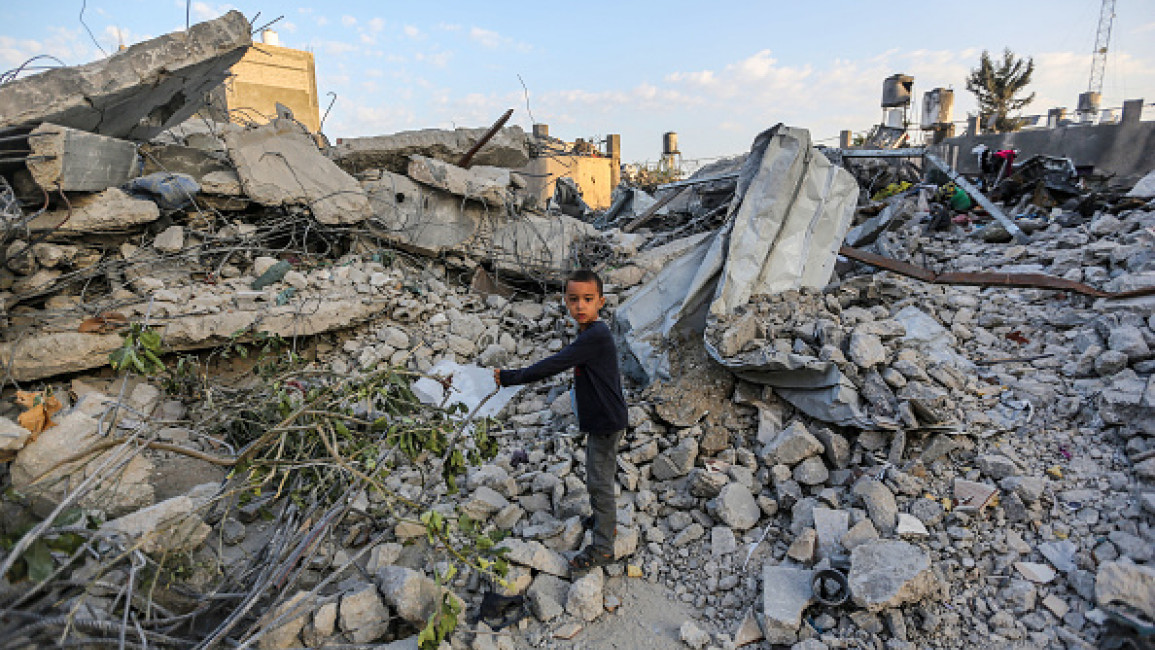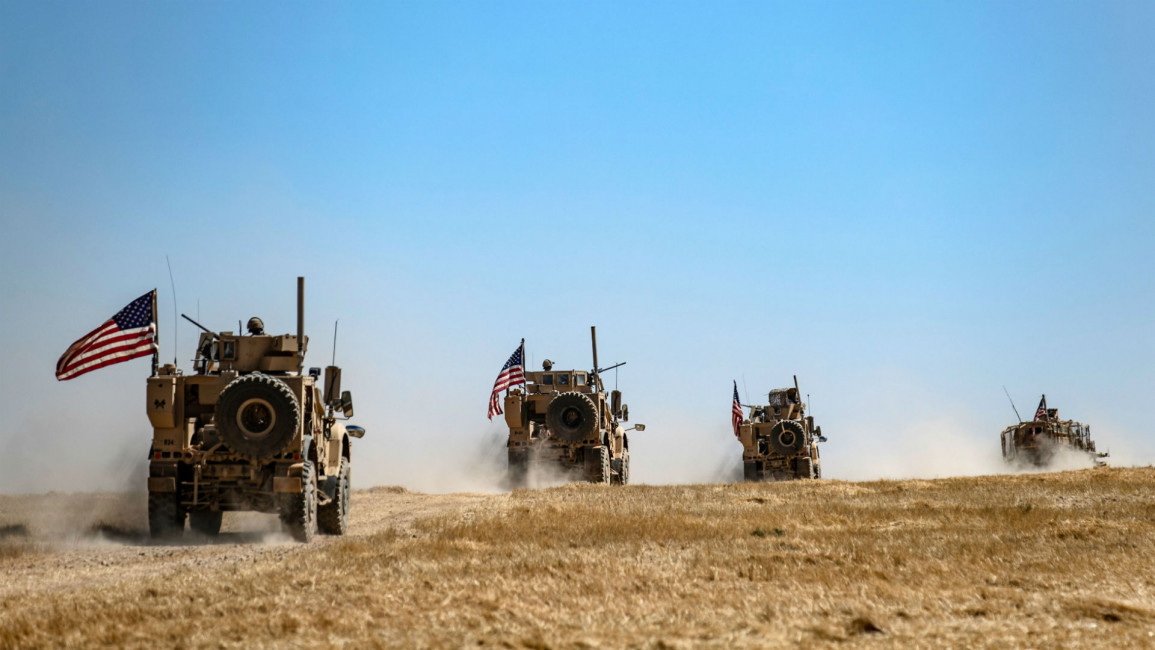
What will Israel's war on Gaza mean for Syria?

On 31 October, UN Special Envoy for Syria Geir Pedersen warned that the Israel-Hamas war in the Gaza Strip had already spilt over to Syria.
Pedersen justified this grim assessment by highlighting Israel’s airstrikes on Damascus and Aleppo airports and attacks by Iran-aligned militant groups on US forces in Syria.
The Gaza war is the latest in a series of setbacks for the Syrian people. The Syrian regime has expanded bombardments against rebel pockets in northwestern Syria. These bombings mirror pre-2020 levels of intensity.
After the 1 October Turkish Police Service building attack in Ankara, Turkey carried out a wave of drone strikes in northeastern Syria. Nationwide protests over Syria’s economic decline, which erupted in late August, have triggered clashes between demonstrators and Maher al-Assad’s 4th Armoured Division.
"Israel has carried out airstrikes against Iran-aligned militias in Syria and engaged in cross-border clashes with the Syrian army, while the US has also forcefully responded to a wave of attacks on its forces"
Although the Syrian regime thawed its relationship with Hamas in October 2022 and has expressed solidarity with Gaza, it has refrained from large-scale escalations against Israel.
Nevertheless, Israel has carried out airstrikes against Iran-aligned militias in Syria and engaged in cross-border clashes with the Syrian army.
The US has also forcefully responded to a wave of attacks on its forces in Syria, which could augment pressure on President Bashar al-Assad.
Assad's relationship with Hamas and response to the Gaza war
The Gaza war’s outbreak came one year after Syria’s rapprochement with Hamas. In October 2022, Hamas’s chief of Arab relations Khalil al-Hayya visited Syria.
Al-Hayya’s meeting with Assad ended a decade of hostility caused by Hamas’s support for anti-Assad rebels in the Syrian civil war. A senior Hamas official proposed re-establishing the group’s office in Damascus, which was shuttered in 2012.
Despite these conciliatory gestures, Syria’s cooperation with Hamas has been hampered by deep-seated grievances. In a 9 August interview with Sky News Arabia, Assad described Hamas’s past position on the Syrian civil war as a “betrayal” and claimed that Hamas’ waving of the flag of “French occupation in Syria’ undermined its standing as a resistance group.
While Assad clearly distinguished between the Hamas leadership and the group’s adherents, his comments underscored lingering mistrust.
The Hamas leadership also faced internal resistance to normalising with Assad. After al-Hayya’s Damascus trip, Palestinian activist Abier Khatib declared “Politics moves fast when you are devoid of morals. Hamas makes me ashamed to be Palestinian”.
|
|
Hamas supporters residing outside the occupied Palestinian territories also largely objected to the decision. Strategic factors ultimately trumped this resistance in Hamas’ calculations. As Iran and Hezbollah brokered their normalisation agreement, Hamas believed that thawing relations with Assad would strengthen its ties with Tehran.
The Syrian regime's response to the Gaza war has featured strident rhetoric but restrained action, as it does not wish to assume political and security risks on Hamas’s behalf. On 28 October, Syrian Foreign Minister Faisal Mekdad castigated Israel as a “fascist government” and asked “What crimes did fascism commit in World War II that Israel did not commit?”
On 2 November, Mekdad claimed that Israel’s position as an “occupying state” denied it the right to strike Gaza in self-defence and claimed that self-defence logic was sugar-coating for “genocide and war crimes”.
"The Syrian regime's response to the Gaza war has featured strident rhetoric but restrained action, as it does not wish to assume political and security risks on Hamas' behalf"
Despite this rhetoric, the Syrian regime has confined its military actions against Israel to sporadic cross-border shelling and rocket attacks on the occupied Golan Heights.
The UAE’s warning against expansive Syrian involvement in the Gaza war might explain Assad’s restraint. Political calculations also likely play a part.
While the Syrian opposition remains focused on internal problems and has not organised large-scale pro-Palestinian protests, it partook in rallies that compare Assad’s assault on Idlib to Israel’s bombardment of Gaza. A military response to Israel’s actions in Gaza could draw further attention to Assad’s double standards.
Israel's intensification of airstrikes against Syria
While Israeli airstrikes on Iranian military assets in Syria have been a regular feature of the war at least for a decade, they have intensified in recent weeks. On 12 and 22 October, Israel carried out simultaneous attacks on Damascus and Aleppo airports, which forced flights to be diverted to Latakia.
Israel’s strikes stemmed from its fear that Iran could use Syrian airports to transport military hardware to its militia allies. The 12 October airport attack forced a Syria-bound Iranian Mahan Air flight to return to Tehran. Mahan Air has been linked to financial, personnel and arms transfers from Iran’s Islamic Revolutionary Guard Corps (IRGC) to Hezbollah.
The breakdown of Israel-Russia intelligence sharing over Syria, which has been accompanied by the Wagner Group’s alleged transfer of a Syrian Pantsir S-1 to Hezbollah, has also encouraged Israeli unilateralism.
In response to Israeli airstrikes, Syria has strengthened its engagement with Iran. After claiming that Israel’s airstrikes sought to disrupt its diplomacy with Syria, Iran’s Foreign Minister Hossein Amir-Abdollahian visited Damascus on 14 October. Abdollahian’s trip focused on Gaza, as Assad backed Iran’s plans for an Organization of Islamic Cooperation (OIC) emergency foreign ministers meeting on the Gaza War, but deeper Iran-Syria military cooperation is possible.
|
|
Since 2021, the IRGC has spent tens of millions of dollars on bolstering Syria’s air defences against potential Israeli airstrikes. These investments have not thwarted Israeli aerial attacks and resulted in the death of IRGC Aerospace Force Colonel Davoud Jafari, who was a key figure in Iran’s air defence construction campaign.
Despite these setbacks, the program’s inclusion of Sayyad 4B solid-propellant missiles, which can operate 300km range Bavar-373 surface-to-air missiles, could pose a threat to advanced Israeli fighter jets.
The trade-off for this military assistance could be deepened by Syrian military support for Hamas. Iran-aligned militias have launched a pro-Hamas public relations campaign in Deir az-Zour’s cultural centres and tried to recruit volunteers to fight Israel from the Golan Heights.
While Iran has mirrored Assad’s military restraint towards Israel thus far, it wants its Syrian allies to be prepared in the event of a future escalation.
"As Assad balances maintaining stability at home and abetting Iran's regional ambitions, Israeli and US strikes on Syria will likely intensify in the weeks ahead"
The US counters threats to its military installations in Syria
During the first two years of Joe Biden’s presidency, Iran-aligned militias attacked US forces in Syria on 80 occasions. While most of these attacks resulted in no casualties and little material damage, their escalating intensity since the Gaza war’s outbreak has alarmed US officials. From 2 to 6 November, Iran-aligned militias targeted US bases in Iraq and Syria at least 10 times.
The US has taken decisive measures to counter these attacks. In response to the 18 October strike on the US’ al-Tanf base in Syria, which houses 900 US troops involved in anti-IS operations, the US struck two IRGC-linked facilities in eastern Syria on 26 October. The US has framed these attacks as self-defence strikes, which will stop as soon as Iran-aligned militias cease their aggression against US forces.
The US deployment of two aircraft carrier strike groups to the Middle East is another deterrence display against Iran-aligned militias that wish to strike its forces in Syria. This mirrors the extension of the George H.W. Bush carrier strike group’s deployment to Syria in March 2023, which followed the injury of 12 American troops in an Iran-linked attack.
The US has also dispatched a radar system to the Al-Omar oil and Konko gas fields in Deir az-Zour. These energy facilities are located near US troops.
Despite this forceful response, Iran-aligned militias are unlikely to stop their attacks on US bases. Iranian officials regularly describe the US as an occupying power in Syria and view the US as an accomplice to Israel’s assault on Gaza.
The state-owned Al-Alam media outlet has accused US forces of trying to strengthen the Islamic State (IS) in Syria, help Israel plan aggression against Lebanon, and stage a chemical attack that would discredit Assad.
As these attacks persist, the US will likely pair military retaliations with increased pressure on Assad’s government. On 30 October, US Ambassador to the UN Linda Thomas-Greenfield urged Assad to “stop playing the victim card” and to thwart Iran’s use of Syrian civilian airports for threatening activities.
The US could also continue stiffening its sanctions against Syrian officials implicated in human rights abuses.
While Syria has avoided becoming involved in a full-scale war with Israel, it cannot stay fully detached from the Gaza war’s escalation.
As Assad balances maintaining stability at home and abetting Iran’s regional ambitions, Israeli and US strikes on Syria will likely intensify in the weeks ahead.
Samuel Ramani is a tutor of politics and international relations at the University of Oxford, where he received a doctorate in 2021. His research focuses on Russian foreign policy towards the Middle East
Follow him on Twitter: @SamRamani2




